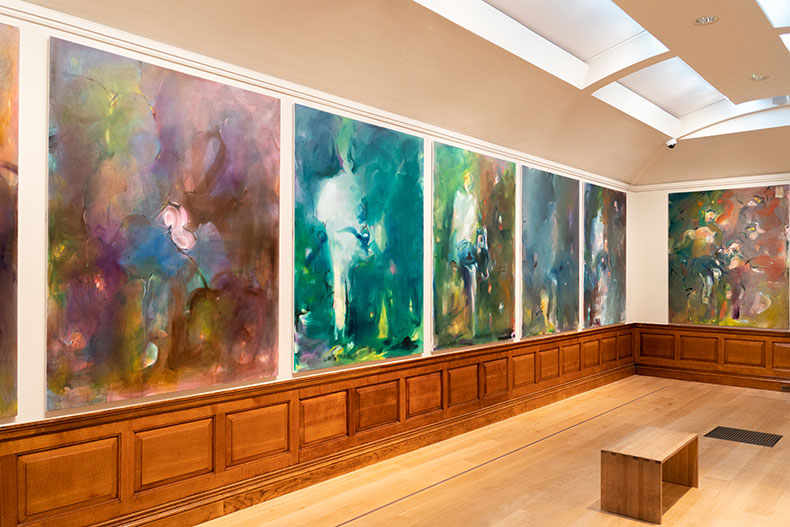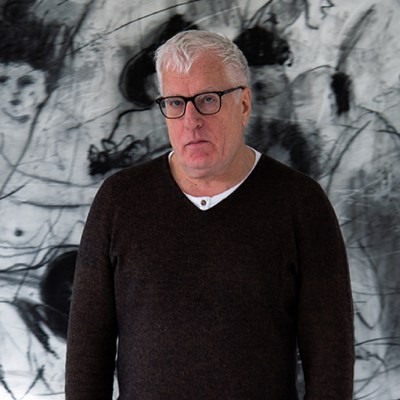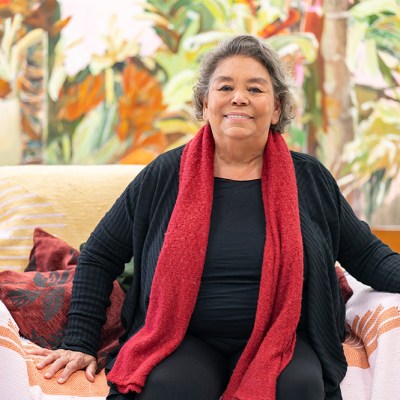Born in Jamaica in 1960, Anthony Daley moved to the United Kingdom in 1972 and has lived in South London ever since. While his paintings are predominantly abstract, he often begins them with still-life arrangements which he reworks until they dissolve into luminous, fluid brushstrokes. His current exhibition at the Dulwich Picture Gallery in London (until 2 April 2023) features a new suite of paintings inspired by the work of Peter Paul Rubens – in particular, Venus, Mars and Cupid (c. 1635), in the collection of the Dulwich. According to Daley, the painting caused an important shift in his practice in the 1980s: ‘I became attached to that painting, and challenged by it on many levels – politically, psychologically, technically […] I aggressively went more abstract because of that painting.’ Another exhibition of the artist’s work is on display at Flowers Gallery from 12 January–4 February.
Where is your studio?
My current studio is in Deptford.
How would you describe its atmosphere?
At the moment, I’m having a crisis. About ten years ago, I realised that my studio space was really crammed with work – I didn’t have anywhere to store it. There’s too much stuff, but that’s life. I have to make it work!
I set myself to work like it’s a factory. I make a lot of works, but I tend to roll them away. I came to the realisation that I don’t really see my paintings! When I come to exhibit, that’s when I get to see them.
Funny How That (2022), Anthony Daley. Courtesy Flowers Gallery; © Anthony Daley

What’s your favourite time of day to be in the studio?
When I left art school, one of my professional challenges was to be as productive as Picasso. I thought Picasso lived in a time when there wasn’t such as a thing as a nine to five! I tend to get into the studio at about nine or ten and leave at nine or ten at night.
Do you listen to music while you work?
I used to want to be a classical composer or a concert pianist. Music, for me, feels like work. If I listen to a piece of music, I get deeply frustrated. In the same way that when I see a really good painting, I want to get better. So, I don’t listen to music in my studio.
When I arrive in the morning, I tend to put the radio on to emotionally warm up the space – usually, BBC Radio 4. When the work properly starts, I turn it off. I know that if I put some reggae on, I would get very high-spirited and want to get up and dance around the studio, but that wouldn’t really help me with the painting.
Installation view of ‘Anthony Daley: Son of Rubens’ at Dulwich Picture Gallery. Courtesy Dulwich Picture Gallery

What’s the weirdest object in there?
As a child in Jamaica, I had to feed my family: I was the main breadwinner. I did so by going through piles of rubbish and finding things to sell and to create from. So, I have this really deep, ingrained interest in other people’s rubbish. It’s the same in England and there’s so much of it!
When I was studying at Chelsea Art School, I was intrigued by what I found on the streets. I would pick things up and work with them. I had a latent response to objects and things I’d find.
These days, I’m still quite interested in the things I find in the estate across the road from the studio, in what people throw out. It’s hard to pick a single object that’s in the studio currently, but I am particularly interested in old paintings or prints that people throw away – sometimes I rework them, others I keep. There’s a whole story behind [these objects].
Dividing Line (2022), Anthony Daley. © Anthony Daley; courtesy Flowers Gallery

Who’s the most interesting visitor you’ve had to your studio?
When I’m having a crisis, my friend Grace comes to talk to me about the work. I just need a fresh pair of eyes. She’s like my guru – she tells me what she thinks and stops me from going crazy.
Recently, I’ve had the occasional buyer come round to the studio. It’s like a new kind of falling in love for me. They come and look at the work – it feels very different from when a gallerist or fellow artist comes. They’re talking about the work and I’m just falling in love with them. It’s a kind of honesty. It’s such a beautiful experience.
‘Anthony Daley: Son of Rubens’ is at Dulwich Picture Gallery, London, until 2 April 2023. His work will also be on show at Flowers Gallery, London, from 12 January–2 February 2023.



